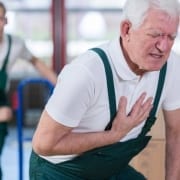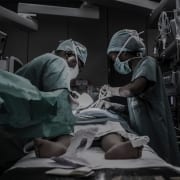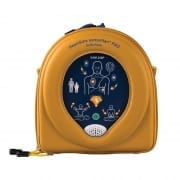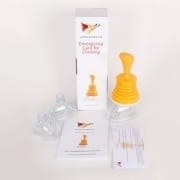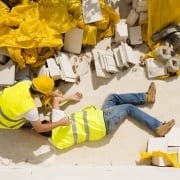Heart Attack Awareness
A Heart Attack can occur when the coronary artery becomes block reducing the amount of blood and oxygen to the heart muscle and tissues causing damage.
There are some myths when it comes to recognising signs and symptoms of someone who maybe having a heart attacks. Many people believe the pain has to be extreme or intense but this is a completely false, as some sufferers say their heart attack was simply discomfort, mildly painful or a sense of indigestion.
Often when an individual is having a heart attack, they will probably look for signs and symptom to what they have seen movie or on television. Studies have shown women are prone to having heart attacks without knowing it, putting them at a greater risk for complications or problems.
Some women may think they are not at risk for a heart attack, but actually they are at a high risk for having one. Speaking with your doctor about any potential problems associated with heart attack in your family history or as a result to a current medical issue before dismissing the threat.
If you suspect, you are or someone with you are having a heart attack but not sure call the emergency services immediately by call 999 / 112 stating a suspected heart attack.
The latest figures from the British Hearts Foundations shows that in any one day in the UK approximately:
7 million people are living with CVD
420 people will lose their lives to Cardiovascular Disease (CVD)
110 people will be younger than 80
540 hospital visits will be due to a heart attack
12 babies will be diagnosed with a heart defect
What are the warning signs and symptoms?
The signs and symptoms of heart attacks may vary person to person. They differ between individuals, but also between men and women.
Chest pain or discomfort – The chest pain that is sudden or gradually this is associated with a heart attack may not be overwhelming, but rather an uncomfortable feeling. This discomfort has been said to come and go, feeling like a pressure on the sufferer’s chest or an uncomfortable squeezing feeling. Usually, during a heart attack, any pain or discomfort originates in the centre of the victim’s chest.
Upper body discomfort– Many heart attack victims relate that they experienced discomfort in their upper body, especially their shoulder, back, jaw, or arms, before the sensation affected their chest. This can also include an unusual sensation in the stomach. For this reason, a heart attack can be easily mistaken for heartburn or a simple stomach ache.
Shortness of breath– Usually occurring simultaneously with pain or discomfort in the chest, shortness of breath can be anything from the inability to catch one’s breath to being unable to properly breathe. Many heart attack victims dismissed this symptom as a side effect of whatever activity in which they were participating when the heart attack occurred.
Nausea or Vomiting – The feeling of being sick to one’s stomach is commonly associated with early warning symptoms of a heart attack. This symptom coupled with discomfort in the stomach can lead the heart attack to dismiss the symptoms as a simple stomach ache or stomach flu.
Pulse – Pulse often becomes rapid, irregular or missing beats depending on which area has a lack of oxygen.
Other symptoms– Can include a general feeling of lightheaded or dizziness, shortness of breath, sweaty or clammy or a sense of fear or doom causing an overall feeling of unease and discomfort.
What treatment immediate treatment is needed?
· Call the Emergency Services 999 / 112 stating you suspect a hearts attack.
· Sit down in a comfortable position with your knees up to your chest.
· Take your Glyceryl-Tri-nitrate (GTN) Medication Spray if you have it.
Or
· If not allergic to aspirin and you are over 16 years old chew 150 to 300mg of aspirin tablets as this will help to limited the damage to your heart. Chewing the tablets is the best way to allow it to absorb in your body quickly.
· Remain calm, reassure the patient and remove any cause of stress and worry if possible.
Understanding the risking resulting in a hearts attack
Knowledge is Powerful!
Research has identified key factors that increases the risk of Coronary Heart Disease but in particular Heart Attacks.
· Age
· Family History of Heart Disease
· Ethnicity (African, African -American, African – Indians or Mexican Americans are more likely to have a hearts attack)
· High Blood Pressure
· High Cholesterol
· Lack of Exercise or Physical Inactivity
· Obesity and being overweight
· Diabetes
· Stress
· Alcohol and drugs miss use
· Smoking
· Diet, Fluids and Nutrition
How to reduce your risk?
- Stop smoking and minimize exposure to second-hand smoke.
- Control high blood cholesterol and high blood pressure by making changes to your diet, lose weight, take medication.
- Take daily exercise.
- Limit your alcohol consumption.
- Eat a healthy and balanced diet, rich in vitamins and minerals and drink 1.5 to 2 litres of fluids each day particularly water.
- Monitor your weight and try and lose weight if you’re overweight or obese.
- Diabetics should manage their blood sugar and stick to their treatment plans.
- Reduce stress in your life with relaxation techniques such as deep breathing or yoga or try talking therapies.
To learn more, it’s strongly advised that you complete an online or attend a practical first aid course to understand what to do in a medical emergency.
For more information about training contact us on +44(0) 1785 532 219 or email info@safeheartstraining.co.uk
Safe Hearts Training provides this information as a guidance and it is not in any way a substitute for medical advice. Safe Hearts Training is not responsible or liable for any diagnosis made or actions taken based on this information.

